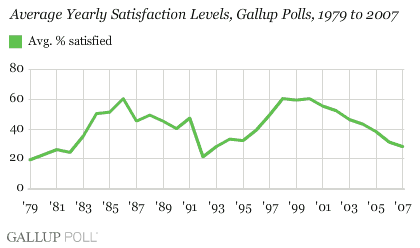PRINCETON, NJ -- The latest ���۴�ýPoll finds 27% of Americans saying they are satisfied with the way things are going in the country, while 70% are dissatisfied. That is an improvement from last month, when 20% were satisfied, the worst rating ���۴�ýhad recorded since 1992. The increase in reported satisfaction levels has served only to restore satisfaction to its pre-November levels, which are low by historical standards.
Overall, less than 30% of Americans have been satisfied with the way things are going in the United States since May. That eight-month string is the longest ���۴�ýhas measured since it began tracking national satisfaction on a monthly basis in 2001. Prior to 2001, ���۴�ýasked this question frequently -- though not on a monthly basis. Throughout 1992 and during nearly all of 1993, satisfaction levels were consistently below 30%. ���۴�ýalso did not register any satisfaction ratings above 30% in 1979 or 1982, though it asked the question just three times in each of those years.
Thus, 2007 rates as one of the worst years for satisfaction ratings. The accompanying graph shows the yearly averages since 1979, when ���۴�ýstarted asking this question. To date, the lowest yearly averages were 19% in 1979, 26% in 1981, 24% in 1982, 21% in 1992, and 28% in 1993. The average for 2007 is 28%. The highs were 60% averages in 1986, 1998, and 2000.

Last month, for the first time since September 2006, more Americans mentioned some aspect of the economy as the most important problem facing the country than mentioned the war in Iraq (31% to 24%). In this month's update, the proportion mentioning the economy is unchanged, but mentions of the war increased slightly to 29%, so the two issues are now about equally mentioned as the top problem.
Beyond those two issues, the most commonly mentioned problems are illegal immigration (11%), healthcare (9%), dissatisfaction with government (8%), and ethical and moral decline (6%).
Apart from the slight bump in mentions of the Iraq war, the results of this question changed little from last month.
The specific economic concerns most often mentioned are the general state of the economy (13%), fuel and oil prices (5%), the high cost of living and inflation (3%), unemployment (3%), and the federal budget deficit (3%).
Survey Methods
These results are based on telephone interviews with a randomly selected national sample of 1,027 adults, aged 18 and older, conducted Dec. 6-9, 2007. For results based on this sample, one can say with 95% confidence that the maximum error attributable to sampling and other random effects is ±3 percentage points. In addition to sampling error, question wording and practical difficulties in conducting surveys can introduce error or bias into the findings of public opinion polls.
